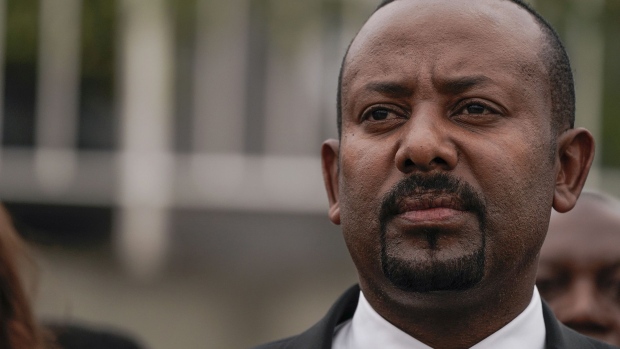“To meet the vast humanitarian needs in Tigray, 100 trucks carrying tons of food and life-saving supplies need to arrive each day, which should have meant a total of 5,000 trucks since July 1. However, as of a few days ago, only around 320 had arrived—less than 7 percent of what is required.”
On The Humanitarian Situation In Ethiopia
United States Agency for International Development
Office of Press Relations
Statement
Samantha Power, Administrator
August 19, 2021
In Tigray, where hundreds of thousands are facing famine, food warehouses are virtually empty. This week, for the first time in nine months of conflict, aid workers will run out of food to distribute to the millions of people who are going hungry. USAID and its partners as well as other humanitarian organizations have depleted their stores of food items warehoused in Tigray.
Despite the small trickle of convoys into Tigray and an average of two UN Humanitarian Air Service (UNHAS) flights per week to Mekele during the first half of August, the flow of humanitarian assistance remains woefully insufficient. This shortage is not because food is unavailable, but because the Ethiopian Government is obstructing humanitarian aid and personnel, including land convoys and air access. The U.S. calls on the Ethiopian Government to immediately allow humanitarian assistance to swiftly move into Tigray in order to prevent a catastrophic stop to food assistance that millions need to survive.
Humanitarian organizations have food loaded onto trucks, and they are waiting in Semera, Afar, and other places in Ethiopia, but for the last month and a half only a small trickle of aid convoys has been allowed into Tigray. To meet the vast humanitarian needs in Tigray, 100 trucks carrying tons of food and life-saving supplies need to arrive each day, which should have meant a total of 5,000 trucks since July 1. However, as of a few days ago, only around 320 had arrived—less than 7 percent of what is required. While the Government of Ethiopia has been quick to hail the limited aid as a positive step, it is far too little and far too late. People in Tigray are starving with up to 900,000 in famine conditions and more than five million in desperate need of humanitarian assistance.
Humanitarian workers continue to face entirely too many hurdles to make aid convoys happen. They have encountered unacceptable delays at multiple checkpoints, some of which take hours to clear, as well as repeated intensive searches. Aid workers are harassed, and we have seen an increase in troubling and harmful rhetoric coming from the Ethiopian Government against humanitarians. Instead, we need to see action from the Government of Ethiopia that will enable humanitarians to do their jobs and save lives. Fuel deliveries, electricity, telecommunications, and banking services must all be immediately restored and maintained, and humanitarians and relief supplies need to be allowed to move quickly, regularly, and unimpeded into Tigray. In addition, restrictions on aid organizations bringing cash and telecommunications equipment into Tigray need to be lifted in order to facilitate the delivery of lifesaving assistance.
The TPLF’s offensive into other regions will only prolong this conflict and the suffering of the Ethiopian people. The United States urges the TPLF to halt its offensive and withdraw its forces immediately from the Amhara and Afar regions, the Amhara regional government to withdraw its forces from western Tigray, and the Eritrean government to withdraw its forces immediately and permanently from Ethiopia.
The United States remains committed to the welfare of all Ethiopians. All parties must allow humanitarian aid to reach the people whose survival depends on it, and they must end hostilities and commit to a negotiated ceasefire.
For the latest updates on U.S. humanitarian assistance for the Tigray response, visit: Ethiopia | Humanitarian Assistance | US Agency for International Development.


























